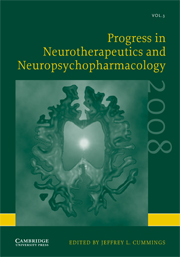Book contents
- Frontmatter
- Contents
- Contributors
- Progress in Neurotherapeutics and Neuropsychopharmacology 2008
- Triflusal versus Aspirin for the Prevention of Stroke
- The Argatroban and tPA Stroke Study
- Use of Selegiline as Monotherapy and in Combination with Levodopa in the Management of Parkinson's Disease: Perspectives from the MONOCOMB Study
- Ropinirole 24-h Prolonged Release in Advanced Parkinson Disease: Review of a Randomized, Double-Blind, Placebo-Controlled Study (EASE PD-Adjunct Study)
- Insulin Resistance Alzheimer's Disease: Pathophysiology and Treatment
- Targeting Amyloid with Tramiprosate in Patients with Mild-to-Moderate Alzheimer Disease
- Intranasal Zolmitriptan Is Effective and Well Tolerated in Acute Cluster Headache: A Randomized Placebo-Controlled Double-Blind Crossover Study
- Optimal Dosing of Immunomodulating Drugs: A Dose-Comparison Study of GA in RRMS
- Tetrathiomolybdate versus Trientine in the Initial Treatment of Neurologic Wilson's Disease
- Randomized Clinical Trials of Pregabalin for Neuropathic Pain: Methods, Results, and Implications
- Effect of Methylphenidate in Patients with Acute Traumatic Brain Injury; a Randomized Clinical Trial
- Improvement in Speeded Cognitive Processing After Anti-epileptic Drug Withdrawal–A Controlled Study in Mono-therapy Patients
- A Randomized-Controlled Trial of Bilateral rTMS for Treatment-Resistant Depression
- Serotonin Related Genes Affect Antidepressant Treatment in Obsessive–Compulsive Disorder
- Night Eating Syndrome and Results from the First Placebo-Controlled Trial of Treatment, with the SSRI Medication, Sertraline: Implications for Clinical Practice
- Modafinil: A Candidate for Pharmacotherapy of Negative Symptoms in Schizophrenia
- New Approaches to Treatment of Schizophrenia by Enhancing N-methyl-D-aspartate Neurotransmission
- Subject Index
- Author Index
The Argatroban and tPA Stroke Study
Published online by Cambridge University Press: 13 May 2010
- Frontmatter
- Contents
- Contributors
- Progress in Neurotherapeutics and Neuropsychopharmacology 2008
- Triflusal versus Aspirin for the Prevention of Stroke
- The Argatroban and tPA Stroke Study
- Use of Selegiline as Monotherapy and in Combination with Levodopa in the Management of Parkinson's Disease: Perspectives from the MONOCOMB Study
- Ropinirole 24-h Prolonged Release in Advanced Parkinson Disease: Review of a Randomized, Double-Blind, Placebo-Controlled Study (EASE PD-Adjunct Study)
- Insulin Resistance Alzheimer's Disease: Pathophysiology and Treatment
- Targeting Amyloid with Tramiprosate in Patients with Mild-to-Moderate Alzheimer Disease
- Intranasal Zolmitriptan Is Effective and Well Tolerated in Acute Cluster Headache: A Randomized Placebo-Controlled Double-Blind Crossover Study
- Optimal Dosing of Immunomodulating Drugs: A Dose-Comparison Study of GA in RRMS
- Tetrathiomolybdate versus Trientine in the Initial Treatment of Neurologic Wilson's Disease
- Randomized Clinical Trials of Pregabalin for Neuropathic Pain: Methods, Results, and Implications
- Effect of Methylphenidate in Patients with Acute Traumatic Brain Injury; a Randomized Clinical Trial
- Improvement in Speeded Cognitive Processing After Anti-epileptic Drug Withdrawal–A Controlled Study in Mono-therapy Patients
- A Randomized-Controlled Trial of Bilateral rTMS for Treatment-Resistant Depression
- Serotonin Related Genes Affect Antidepressant Treatment in Obsessive–Compulsive Disorder
- Night Eating Syndrome and Results from the First Placebo-Controlled Trial of Treatment, with the SSRI Medication, Sertraline: Implications for Clinical Practice
- Modafinil: A Candidate for Pharmacotherapy of Negative Symptoms in Schizophrenia
- New Approaches to Treatment of Schizophrenia by Enhancing N-methyl-D-aspartate Neurotransmission
- Subject Index
- Author Index
Summary
ABSTRACT
Background: The benefit of intravenous recombinant tissue plasminogen activator (rtPA) in acute ischemic stroke is related to clot lysis and arterial recanalization. Argatroban is a direct thrombin inhibitor that safely augments the benefit of rtPA in animal stroke models. However, human data on this combination are limited. Design: We report an update of the Argatroban tPA Stroke Study, an ongoing prospective, open-label, dose escalation, safety, and activity study of argatroban and rtPA in patients with ischemic stroke. The primary outcome was incidence of intracerebral hemorrhage; secondary outcome, complete recanalization at 2h. After standard dose intravenous rtPA administration, a 100-μg/kg bolus of argatroban followed by infusion of 1 μg/kg per min for 48 h was adjusted to a target partial thromboplastin time of 1.75 times baseline. Results: Twenty patients with middle cerebral artery occlusions (including 13 men) have been enrolled, with a mean ± SD age of 61 ± 13 years. Baseline median National Institute of Health Stroke Scale score was 12.5 (range, 3–25). The mean ± SD time from symptom onset to argatroban bolus administration was 177 ± 56 min. Symptomatic intracerebral hemorrhage occurred in 2 patients, including 1 with parenchymal hemorrhage type 2. Asymptomatic bleeding occurred in 2 patients and there was 1 death. Recanalization was complete in 7 patients and partial in another 7, and reocclusion occurred in 4 within 2h of rtPA bolus administration.
- Type
- Chapter
- Information
- Publisher: Cambridge University PressPrint publication year: 2008
- 3
- Cited by



